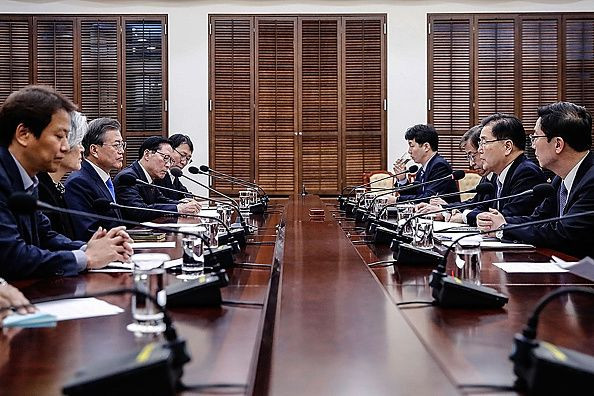South Korea Says Discussing Peace Deal With North Korea Ahead Of Talks

South Korea said on Wednesday it is considering how to change a decades-old armistice with North Korea into a peace agreement, as U.S. officials confirmed an unprecedented top-level meeting with the North Korean leader.
U.S. Secretary of State nominee and CIA Director Mike Pompeo became the most senior U.S. official known to have met North Korean leader Kim Jong Un when he visited Pyongyang at the end of March to discuss a planned summit with U.S. President Donald Trump.
Pompeo's visit provided the strongest sign yet about Trump's willingness to become the first serving U.S. president ever to meet a North Korean leader.
At the same time, old rivals North Korea and South Korea are preparing for their own summit, between Kim and South Korean President Moon Jae-in, on April 27, with a bid to formally end the 1950-53 Korean War a major factor in talks.
"As one of the plans, we are looking at a possibility of shifting the Korean peninsula's armistice to a peace regime," a high-ranking South Korean presidential official told reporters when asked about the North-South summit.
"But that's not a matter than can be resolved between the two Koreas alone. It requires close consultations with other concerned nations, as well as North Korea," the official said.
South Korea and a U.S.-led U.N. force are technically still at war with North Korea after the Korean War ended with a truce, not a peace treaty. The U.S.-led United Nations Command, Chinese forces and North Korea signed the 1953 armistice, to which South Korea is not a party.
"I do not know if any joint statement to be reached at the inter-Korean summit would include wording about ending the war, but we certainly hope to be able to include an agreement to end hostile acts between the South and North," the official said.
Such discussions between the two Koreas, and between North Korea and the United States, would have been unthinkable at the end of last year, after months of escalating tension, and fear of war, over the North's nuclear and missile programs.
But then Kim declared in a New Year’s speech his country was “a peace-loving and responsible nuclear power” and called for lower military tension and improved ties with the South.
He also said he was considering sending a delegation to the Winter Olympics in South Korea in February, a visit that began a succession of steps to improve ties.
Pompeo's visit to the North was arranged by South Korean intelligence chief Suh Hoon with his North Korean counterpart, Kim Yong Chol, and was intended to assess whether Kim was prepared to hold serious talks, a U.S. official said.
Pompeo flew from the U.S. air force base in Osan, south of Seoul, an official with the South's defense ministry said. The South's presidential office declined to comment on the trip.
Amid the diplomatic flurry, CNN reported that Chinese President Xi Jinping also plans to visit Pyongyang soon, after North Korean leader Kim made a surprise trip last month to China, its major sole ally.
WAR NOT OVER
Trump said on Tuesday he backed efforts between North and South Korea aimed at ending the state of war.
"People don’t realize the Korean War has not ended," Trump told reporters.
"It’s going on right now. And they are discussing an end to the war. Subject to a deal, they have my blessing and they do have my blessing to discuss that."
Trump said he believed there was a lot of goodwill in the diplomatic push with North Korea, but added it was possible the summit - first proposed in March and which the president said could take place in late May or early June - may not happen.
If the summit did not happen, the United States and its allies would maintain pressure on North Korea through sanctions, he said.
Nevertheless, Pompeo's conversations in North Korea had fueled Trump’s belief that productive negotiations were possible, according to a U.S. senior official briefed on the trip.
© Copyright Thomson Reuters 2024. All rights reserved.




















